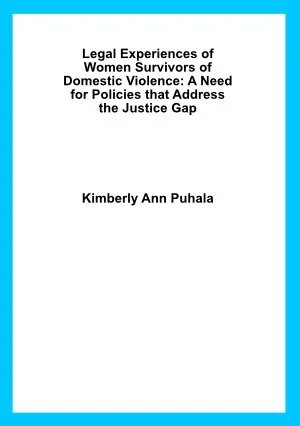By Kimberly Ann Puhala
The problems associated with the civil legal system for women who have experienced domestic violence have been persistent over time and still exist today. The current sociopolitical context in this state frames access to civil legal services either through a means-tested (and underfunded) program (Civil Legal Assistance) or as a privately purchased market service. This leaves a limited amount of low- or no-cost alternatives, which creates a gap in services for those women whose income is too high to qualify for Civil Legal Assistance programs, yet too low to afford to hire a private attorney. This study examines this two-tiered system, and reveals that the alternative to full Civil Legal Assistance or individually purchased full-scale legal representation for iv women who fall into the services gap is a system that is confusing, faces a lack of coordination, and may lead to less than optimal outcomes in civil legal cases related to domestic violence. This study explores the workings of this system from the perspective of the women using it and the service providers within it. Through surveys of 18 women seeking civil legal assistance and 11 interviews with legal services advocates and providers, this research identifies the areas that remain problematic for women who experience domestic violence and turn to the civil legal services for help.
Puhala, Kimberly Ann, "Legal Experiences of Women Survivors of Domestic Violence: A Need for Policies that Address the Justice Gap" (2011). Graduate Doctoral Dissertations. Paper 37.







